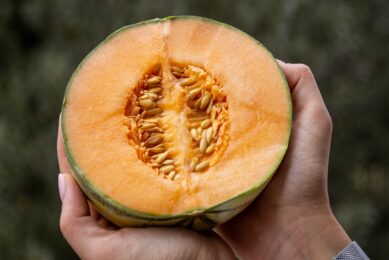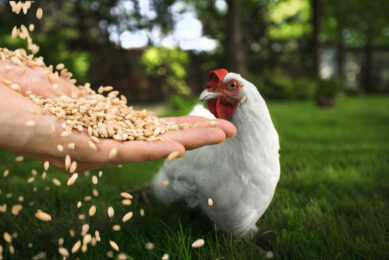Eucalyptus reduces methane in dairy calves

Mitigating methane production is still a major concern in dairy production. Researchers are turning to sustainable and environmentally friendly strategies. The leaf extract of Corymbia citriodora (Eucalyptus) has emerged to be of high efficacy in reducing methane production in dairy calves.
During microbial degradation of feed in the rumen, considerable amounts of energy and nitrogen are lost in the form of methane. Methane is a greenhouse gas with significant potential for increasing global warming. Ameliorating rumen-methane emission, therefore, could result in economic and environmental benefits.
According to a recent study from the Animal Production Research Institute, feeding calves the leaf extract from Corymbia citriodora (Eucalyptus) significantly reduces the production of methane and improves their health status.
Properties of the leaf extract
The researchers stated that the potential of the leaf extract to modify the rumen fermentation and mitigate methane emission in ruminants lies in its secondary metabolites that consist of 1,8-cineole, α-pinene, trans-pinocarveol, p-cymene and pinocarvone. In addition, the extracts of C. citriodora possess antimicrobial (antibacterial and antiprotozoal) and antioxidant properties that are also vital to modulate methane production and improve health.
The study
Thirty crossbred male (Baladi×Holstein Friesian) calves of average body weight (BW) 37.3 ± 0.02kg and aged 4 or 5 days were selected to evaluate the effect of milk supplemented with different doses of aqueous extract of C. citriodora (CC) on methane production, nutrient digestibility, growth performance and health status. Treatments were implemented by mixing CC with milk at levels of 0ml, 10ml and 20ml per calf per day throughout the experimental period of 15 weeks.
Methane reduction
The researchers found that the leaf extract was able to decrease methane emission by 20.1% and 61.5% when C. citriodora was supplemented at 10ml and 20ml, respectively. They cited the reduction in rumen protozoa and methanogenic bacteria as the main causes of the reduced methane production. The reduction in protozoa count and methanogenic bacteria could be attributed to the inhibitory actions of the terpenes and other plant secondary compounds present in C. citriodora. Ruminal protozoa provide the perfect habitat for methanogenic bacteria. In addition, methane production in ruminal fermentation is associated with an increased propionate (C3) percentage and a reduced acetate (C2) percentage and C2:C3 ratio; these reductions were observed in their study (Table 1). The decrease of acetate may be due to a decrease in protozoa population, since acetate is a product of protozoa metabolism.
Antibacterial and antiprotozoal activities
The researchers considered a reduction in common pathogenic bacteria (Escherichia coli, Enterococcus and Clostridia) involved in calf diarrhoea as an index of health status in their study. These bacteria decreased with an increase in the level of the leaf extract. The decrease in bacterial counts is attributed to the antimicrobial mechanisms of the secondary metabolites of the leaf extract, which include enzyme inhibition, cell membrane disruption, substrate deprivation and prevention of bacterial colonisation. These secondary metabolites are mainly 1,8-cineole, α-pinene, trans-pinocarveol, p-cymene and pinocarvone components.
The researchers also found decreases in protozoa counts of 15.6% and 30.6% when C. citriodora was supplemented at 10ml and 20ml, respectively. Since ruminal protozoa provide the perfect habitat for methanogenic bacteria, their reduction indirectly reduced the production of methane.
 Research: Reducing cow’s methane emission via feeding
Research: Reducing cow’s methane emission via feeding
A new project will look at how to reduce the cow’s methane emission via feeding and the biological reasons why cows differ in methane production. The project is being carried out by researchers at Aarhus University in Denmark.
Antioxidant potency
These researchers also associated the health status of calves with the antioxidant capacity of the leaf extract. They found that the plasma malondialdehyde (MDA) concentration decreased with leaf extract supplementation, while the levels of glutathione peroxidase (GPx), superoxide dismutase (SOD) and catalase (CAT) enzymes increased. The reduced MDA concentration is an indicator of reduced oxidative degradation of lipids, while the increased level of plasma antioxidant enzymes indicates improved antioxidant capacity. Compounds of the leaf extract effectively impair the radical chain reactions by competing with the reactive host components, thus stopping the propagation of the oxidation chain.
Nutrient digestibility and growth
The researchers found lower nutrient digestibility, growth and weight gain from the 20ml leaf extract diet, but the 10ml diet was not different from the unsupplemented (0ml) diet. They attributed these results to the possible negative effects of some of the extract’s plant secondary metabolites (e.g. condensed tannins, saponins, alkaloids) on nutrient digestibility, which in turn affects nutrient absorption.
They also cited a low feed intake that they observed as a contributing factor to low growth rates.
They mentioned that the reduced intakes could be related to reduced palatability; encapsulation of these extracts would help overcome this.
Effects of eucalyptus on nutrient digestibility
Cooperative work from Vietnamese and Thai researchers looked into the effects of eucalyptus (E. Camaldulensis) crude oils (EuO) supplementation on voluntary feed intake and rumen fermentation characteristics in swamp buffaloes.
In conclusion
The leaf extract when supplemented at 10ml/calf/day manipulates rumen fermentation in mitigating methane production without any negative effects on the growth performance of calves. A reduction in methane production spares the energy for calf production and helps curb the negative effects of global warming due to this greenhouse gas emission.
Apart from increasing the plasma antioxidant enzymatic activities, the leaf extract supplementation, irrespective of the dosage, shows a marked reduction in faecal pathogenic bacterial counts and increased antioxidant capacity, indicating improved health status.
This article is based on the original article by A. Hassan, S.H. Abu Hafsa, M.M.Y. Elghandour, et al. 2020. Influence of Corymbia citriodora leaf extract on growth performance, ruminal fermentation, nutrient digestibility, plasma antioxidant activity and faecal bacteria in young calves,
Animal Feed Science and Technology, Vol 261, 2020, 114394. 10.1016/j.anifeedsci.2020.114394.











